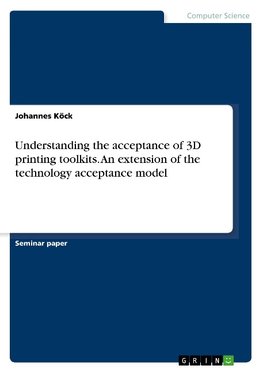
-
 Anglický jazyk
Anglický jazyk
Understanding the acceptance of 3D printing toolkits. An extension of the technology acceptance model
Autor: Johannes Köck
Seminar paper from the year 2015 in the subject Computer Science - Internet, New Technologies, grade: 1,3, Friedrich-Alexander University Erlangen-Nuremberg, language: English, abstract: The goal of this paper to find out factors that affect the acceptance... Viac o knihe
Na objednávku, dodanie 2-4 týždne
16.65 €
bežná cena: 18.50 €
O knihe
Seminar paper from the year 2015 in the subject Computer Science - Internet, New Technologies, grade: 1,3, Friedrich-Alexander University Erlangen-Nuremberg, language: English, abstract: The goal of this paper to find out factors that affect the acceptance of 3D printing toolkits. A hypothesized research model for 3D printing toolkits is proposed. Based on a survey of 30 participants this research model is analyzed and evaluated. The result is, that five of these seven proposed determinants have a strong influence on the Behavioral Intention to Use such a toolkit.
Additive manufacturing, also known as 3D printing (3DP), is a technology which gained a lot of interest in recent years. The market is supposed to grow further with a new annual growth record of 35 % in 2013. However, the world leading market report for additive manufacturing, the Wohlers report, states that growth in the upcoming years is especially going to be driven by "3-D printers that cost less than $5,000, as well as the expanded use of the technology for the production of parts, especially metal, that go into final products." [1] Consequently, the following paper focuses on 3D printing for non-experts as more and more citizens can afford this technology and as there is not a lot of research in the field of information systems about 3D printing on the consumer level. Questions such as "What are the needs of consumers regarding 3D printing? Which are the top products the consumers want to produce? How do these non-experts deal with 3D printing design software?" have not been answered satisfactory yet.
The goal of this paper to find out factors that affect the acceptance of 3D printing toolkits. A hypothesized research model for 3D printing toolkits is proposed. Based on a survey of 30 participants this research model is analyzed and evaluated. The result is, that five of these seven proposed determinants have a strong influence on the Behavioral Intention to Use such a toolkit. There are two different fields of IS research: Behavorial science (BS) and Design Science (DS) [2] [3]. For both fields an effective literature review is the basis. However, while the design-oriented research creates IT artifacts the behavioral research creates theories about these artifacts and tries to check the truth of these theories. Theories that have been found to be empirically adequate, in turn, serve design-oriented researchers for new IT artifacts [2]. Consequently, as this research is based on TAM and as it tries to validate the truth of TAM related to 3DP, this research paradigm is in the field of BS.
- Vydavateľstvo: GRIN Verlag
- Rok vydania: 2017
- Formát: Paperback
- Rozmer: 210 x 148 mm
- Jazyk: Anglický jazyk
- ISBN: 9783668555457

 Nemecký jazyk
Nemecký jazyk 










